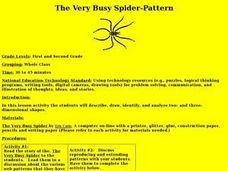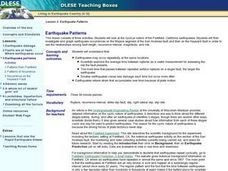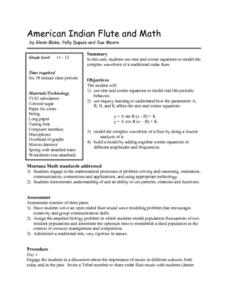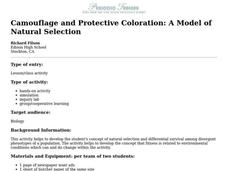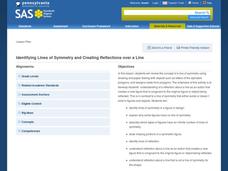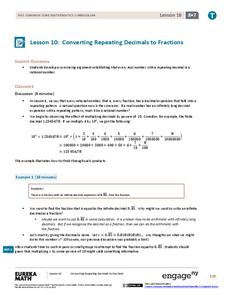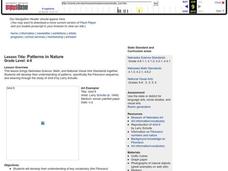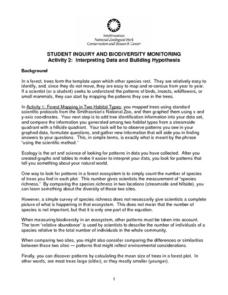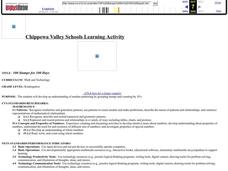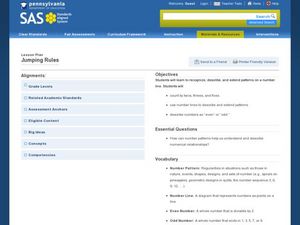Curated OER
The Very Busy Spider-Pattern
Young scholars explore two- and three-dimensional shapes. In this very busy spider lesson, students read the story and then create a spider web pattern of their own. The webs must use a symmetrical pattern. Additional...
Curated OER
Earthquake Patterns
Students identify and interpret the cyclical nature of the Parkfield, California earthquakes. They then investigate and graph earthquake occurrences on the Mojave segment of the San Andreas fault and then on the Hayward fault in order to...
Curated OER
American Indian Flute and Math
Students investigate the Math behind Musical instruments in this cross-curricular Math lesson on the Native American Flute and waveforms. The lesson can be accomplished in 6 days and includes an extensive materials list for successful...
Curated OER
Applied Science - Science and Math Pre Lab
Students find Fibonacci sequences. In this applied Science instructional activity, students solve Fibonacci sequence problems. Students explore the mathematical patterns of objects in nature.
Curated OER
Adire Eleko Cloth Glue Patterns
First graders are introduced to the art form of African Adire Eleko cloth - painted patterned textiles. They use paper, glue and paint to imitate the technique and create similar patterns on paper.
Curated OER
Patterns on Parade
First graders discover that patterns exist in sounds, movement, and objects. In this patterns lesson, 1st graders select two items from a group and produce an alternating pattern.
Curated OER
Patterns and Sequences
Sixth graders explore pattern recognition and sequencing. They create arithmetic and geometric sequences with colors, shapes, and numbers. Students write expressions of arithmetic sequences and geometric sequences to find the nth term.
Curated OER
Camouflage and Protective Coloration: A Model of Natural Selection
Students investigate natural selection and differential survival among divergent phenotypes of a population. Using everyday items , they model adaptations of camouflage and protective coloration in two very different environments.They...
Curated OER
Multicultural Math Project
Sixth graders examine where mathematics came from. In this Math History lesson, 6th graders complete various activities to understand mathematical reasoning. Students complete critical thinking questions.
Curated OER
Symmetry in Butterflies
Young scholars design butterflies. In this symmetry lesson, students examine butterfly pictures, discuss the symmetry of their wings, and create their own symmetry patterns.
Curated OER
Shape Hunt
Explore the world of shapes! After free tangram exploration and pair share time, learners describe various patterns and shapes in both the natural and designed world. They investigate the use of tangrams to create patterns and shapes.
Curated OER
Identifying Lines of Symmetry and Creating Reflections over a Line
Fifth graders review the concept of a line of symmetry by using pieces of paper that have pictures such as, letters of the alphabet, polygons, and designs made from polygons in order to determine if they have symmetry. The fine,...
EngageNY
Converting Repeating Decimals to Fractions
Develop a process with your classes for converting repeating decimals to fractions. Through this process, pupils understand that any repeating decimal can be written as a fraction. The 10th lesson in this 25-part module helps...
EngageNY
Describing Variability Using the Interquartile Range (IQR)
The 13th activity in a unit of 22 introduces the concept of the interquartile range (IQR). Class members learn to determine the interquartile range, interpret within the context of the data, and finish by finding the IQR using an...
Curated OER
Patterns in Nature
Students learn about artist Larry Schulte and view examples of his work. They create addition sentence for the first seven numbers of the fibonacci sequence and use unifix cubes to build that sentences. Students color and create three...
Curated OER
Mathematics: Technology and Connections
Sixth graders interpret and replicate patterns. For this patterns lesson, 6th graders are given an item with a definite pattern which they must replicate using a calculator or computer and then justify how they relate. Students...
Curated OER
Sew, You Want To Quilt?
Students become familiar with the achievements of the artist Faith Ringgold. They take notice of the patterns in their environment. They connect the mathematical concept of patterns to create a class quilt.
Curated OER
Interpreting Data and Building Hypothesis
High schoolers define the term species, and graph species data together with previously collected data at the National Zoo. They interpret graphed data and recognize patterns in the streamside quadrant versus hillside quadrant. Students...
EngageNY
Building Logarithmic Tables
Thank goodness we have calculators to compute logarithms. Pupils use calculators to create logarithmic tables to estimate values and use these tables to discover patterns (properties). The second half of the lesson plan has scholars use...
West Contra Costa Unified School District
Correlation and Line of Best Fit
Computers are useful for more than just surfing the Internet. Pupils first investigate scatter plots and estimate correlation coefficients. Next, they use Microsoft Excel to create scatter plots and determine correlation...
Curated OER
100 Stamps for 100 Days
Students recognize similarities and generalize patterns. In this math and technology lesson plan, students develop an understanding of number patterning by grouping stamps and counting by 10s.
Curated OER
Jumping Rules
First graders practice identifying number patterns. In this basic patterns lesson plan, 1st graders use a large number line and jump to certain numbers to create, identify or extend a pattern. This lesson plan includes a script to guide...
Curated OER
Understanding Zoning: Its use on the High Line in West Chelsea
Students are introduced to zoning. Evaluating information and reading a land-use map is enclosed in this lesson. List new development projects that they could propose for a given area.
Teach Engineering
Discovering Phi: The Golden Ratio
Fe, phi, fo, fum. This activity leads pairs to find the ratio of consecutive terms of the Fibonacci sequence. The pairs find that the Fibonacci sequence can be found in many places. A discussion with the class shows that the ratios...
